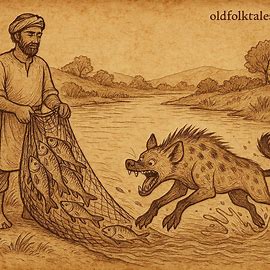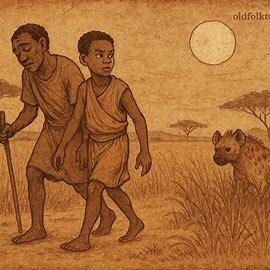Pedro was a well-known trader in birds, traveling across long distances to buy and sell them in distant markets. Whatever birds remained unsold, he carried home, keeping them until the next market day. At home, Pedro lived with his wife and six children, five daughters and a son named Yakob. Yakob, being the only boy, was often restless and curious, unlike his quieter sisters.
One day, Pedro prepared for another long journey to a faraway market. Before departing, he gathered his family and warned them sternly: “There are birds in that house. If anyone lets them out and they are lost, I will punish the one responsible with death.” His voice was sharp and final, leaving no room for disobedience.
Not long after Pedro’s departure, Yakob’s curiosity got the better of him. He longed to see the birds his father kept hidden. Slowly, he pushed the door open to peep inside. In an instant, the startled birds fluttered into the sky, escaping into the nearby forest. Yakob cried out in despair and ran to his mother, confessing his mistake. Though his mother scolded him for disobeying, she could not undo what had happened.
READ: How the Civet and the Tortoise Lost and Regained Their Friendship : A Congolese Folktale
When Pedro returned and discovered the birds gone, rage consumed him. On learning that Yakob had set them free, his anger overcame reason. In a fit of wrath, he seized the boy, killed him, and cast his body into the river.
But fate had not abandoned Yakob. Beneath the waters dwelled compassionate Water-fairies who discovered his body. Moved by pity, they revived him, cared for his wounds, and raised him as their own. They fed him, clothed him, and watched over him until he grew into a fine young man.
One day, the Water-fairies said to Yakob: “You should go out and see the land once more.” They gave him a diçi, a musical instrument, and he set out, playing melodies as he walked. Along the way, Yakob encountered his sisters. With music flowing from his instrument, he sang:
“That which the father cut down and thought was gone, stand aside, girls, and let him pass.”
At first, the sisters only smiled at the song, not recognizing him. But when he revealed his identity, their hearts leapt with wonder. They hurried home to tell their parents what they had seen. Yet Pedro dismissed their tale, insisting: “It was no son of mine, just a passerby.”
Yakob returned to his fairy mothers and told them of the meeting. Wishing to rejoin his people, he asked their permission to go back. The Water-fairies prepared him for the journey, dressing him in fine cloths and adorning him with bells that tinkled pleasantly as he walked. They gave him a cane and instructed him: “When you reach the stream, strike one spot, then another.” Yakob bowed gratefully, saying: “I thank you with all my heart.”
When he arrived at the stream, he followed their guidance. At his first strike, a band of trumpeters emerged, their ivory and brass horns filling the air with music. At the second strike, a hammock appeared with carriers to bear him. Seated in the hammock, Yakob sent word ahead to the chief of his approach.
The chief, honoured by such news, spread his carpet and sat in his chair, surrounded by the applause of his people. Soon the sounds of trumpets drew near, and Yakob’s carriers arrived, placing him with dignity before the chief. Amid drumming, clapping, and joyous shouts, Yakob descended and took his seat.
There he spoke with calm authority: “I am your son, the one you killed. What you cast aside, the Water-fairies saved. They nurtured me until this day. There is a proverb: If the leopard gives birth to a palm-rat, he does not eat it. You might have punished me for breaking your command, but you should not have destroyed me.”
Pedro, struck with grief and shame, fell to his knees before his son. Tears ran down his face as he pleaded: “My child, forgive me, for I have done great wrong.”
Yakob’s mother, overwhelmed with joy, embraced her son. In gratitude, Yakob clothed her in fine garments and later built his own village beside that of his parents, ensuring that his family would live close together once again.
Moral Lesson
This folktale teaches the importance of mercy, forgiveness, and second chances. Harsh anger and rash judgment can cause irreparable harm, yet compassion and reconciliation can heal even the deepest wounds. The story also reminds us that every life holds value, and punishment must never cross the line into destruction.
Knowledge Check
Q1: Who was Pedro, and what was his trade?
A1: Pedro was a bird trader who travelled long distances to buy and sell birds.
Q2: Why did Yakob open the bird house?
A2: Out of curiosity, he opened the door, causing the birds to escape.
Q3: What happened when Pedro discovered Yakob’s mistake?
A3: Overcome by anger, Pedro killed Yakob and threw his body into the river.
Q4: Who revived and cared for Yakob after his death?
A4: The Water-fairies found him, restored him to life, and raised him.
Q5: How did Yakob reveal his identity to his family?
A5: He met his sisters while singing and playing his instrument, later confronting his father before the chief.
Q6: What proverb did Yakob use to teach his father?
A6: “If the leopard gives birth to a palm-rat, he does not eat it,” meaning discipline should not destroy life.
Source: Congolese folktale, Congo.







